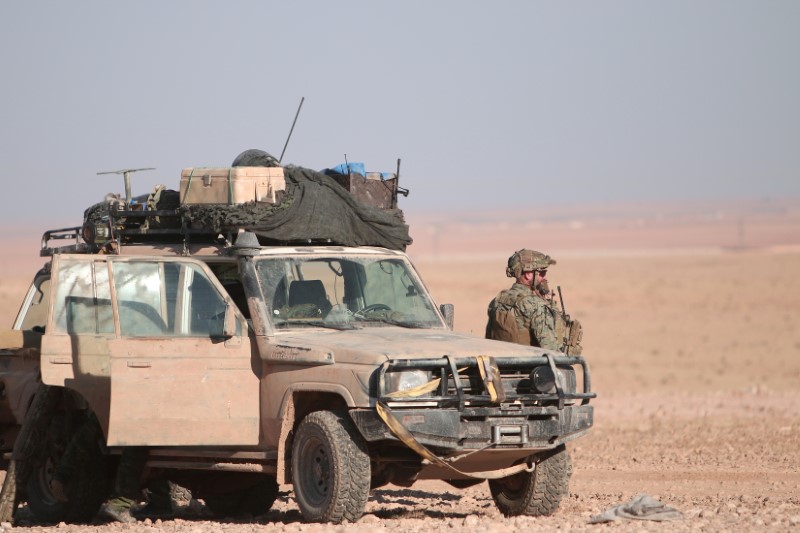

A U.S. fighter stands near a military vehicle, north of Raqqa city, Syria November 6, 2016. REUTERS/Rodi Said
By Phil Stewart
WASHINGTON (Reuters) – The United States has made slight adjustments to its military activities in Syria to strengthen protection of American forces following cruise missile strikes last week on a Syrian air base that heightened tensions, U.S. officials told Reuters on Monday.
The officials, citing operational security concerns, declined to specify what measures the United States has taken after the strikes, which Damascus, Tehran and Moscow condemned.
But one official, who spoke on condition of anonymity, stressed the strikes had not slowed the campaign against Islamic State militants.
U.S. President Donald Trump ordered the cruise missile strike on Syria’s Shayrat air base last week in retaliation for what Washington and its allies say was a poison gas attack by Syria’s government in which scores of civilians died.
The chemical weapons attack killed at least 70 people, many of them children, in the Syrian town of Khan Sheikhoun. The Syrian government has denied it was behind the assault.
Moscow says there is no proof that the Syrian military carried out the attack, and called the U.S. missile strike an act of aggression that violated international law.
A joint command center made up of the forces of Russia, Iran and militias supporting Syrian President Bashar al-Assad on Sunday said the U.S. strike crossed “red lines” and it would respond to any new aggression and increase its support for its ally.
The United States has about 1,000 U.S. forces in Syria advising and training fighters to combat Islamic State and has regularly carried out air strikes against the militants. Those strikes have continued.
But as U.S. jets fly in Syrian airspace, one big question is whether the United States and Russia are keeping open a military communications channel to avoid an accidental clash.
The United States used the channel to advise Moscow ahead of its attack on the Syrian air base, to help ensure Russian personnel, who were also located on part of the base, would not be harmed or misinterpret the cruise missile strikes as an attack on them.
The U.S. military, which confirmed on Friday morning it believed the line of communications was still active, has since stopped commenting on whether it was operational.
Russian media has reported that Moscow has suspended the agreement that allows for those communications, a step that could heighten the risk of an accidental clash.
(Reporting by Phil Stewart; Editing by James Dalgleish)




